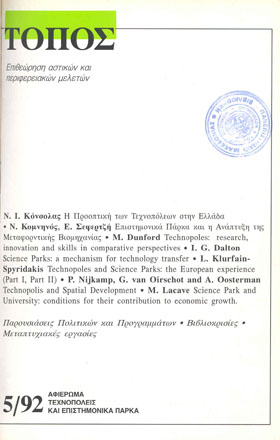Technopoles and science parks: the european experience (Part I); Tecnopoles, science parks, technology parks, micropoles: the european keywords for a generalized phenomenon (Part II)
DOI:
https://doi.org/10.26266/jtovol5pp71-92Keywords:
Technopoles, Science parks, Technology parks, Innovation centers, Urban planningAbstract
Economic policy in modern society is aware of the importance of generating interaction between people involved in creativity, research, innovation and people working in industry, finance and services. In Europe, the concept of Technopoles, Science Park, Innovation Centre or Technology Park, despite considerable differences in the "philosophy" of their initial stage, share basic rules connected with the implementation of specific urban planning, the importance of a linkage between University, companies, training, research, development and high tech production. They appear as the likely answer to the preliminary statement. Successful operation often changed the profile of entire provinces or regions. Attractive environment, high standard quality of services, communication and telecommunications networks, skilled labour, and incentives consolidated their credibility. Development was gradual and kept proportional to the growth of the Park and to the needs it induced. The "Founding Fathers" were Sophia Antipolis (France), Cambridge and Heriot Watt (United Kingdom) more than 20 years ago. Today, from Finland to Greece, politicians, regional and local authorities, park managers, consider Science Parks as a major factor of national development and possibly a major element of the economic, social and cultural evolution of humankind till the end of the century. Economic propellers such as small and medium size enterprises on or outside Science Parks, incubators, start-up, spin-off, the birth of "social engineering", the new relations between University and companies, local transregional, transeuropean networking are the Science Parks contribution to innovation and technology transfer. Science Parks should be the laboratories of local even national economy of the future. They are "a state of mind".Downloads
Published
1992-10-16
Issue
Section
Articles

